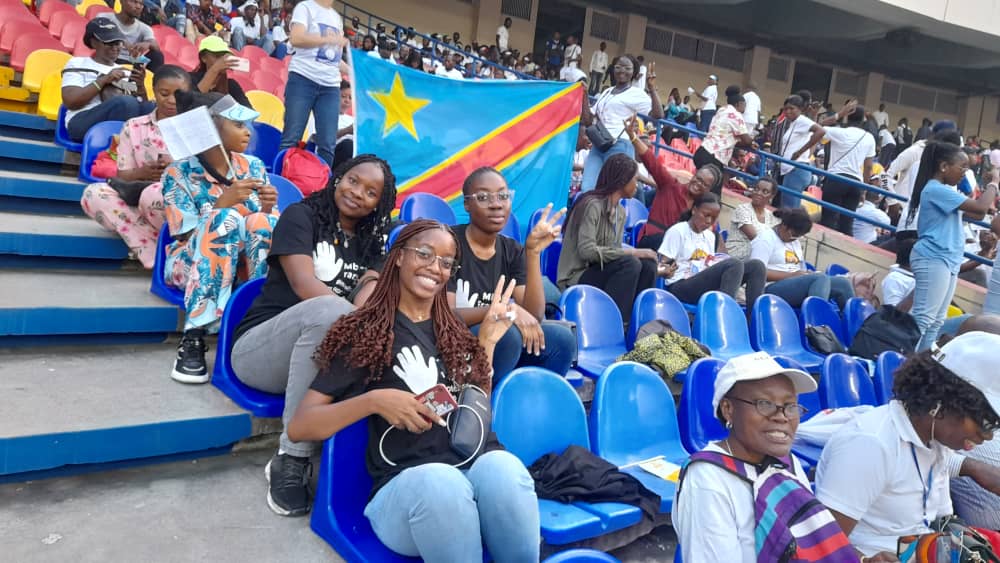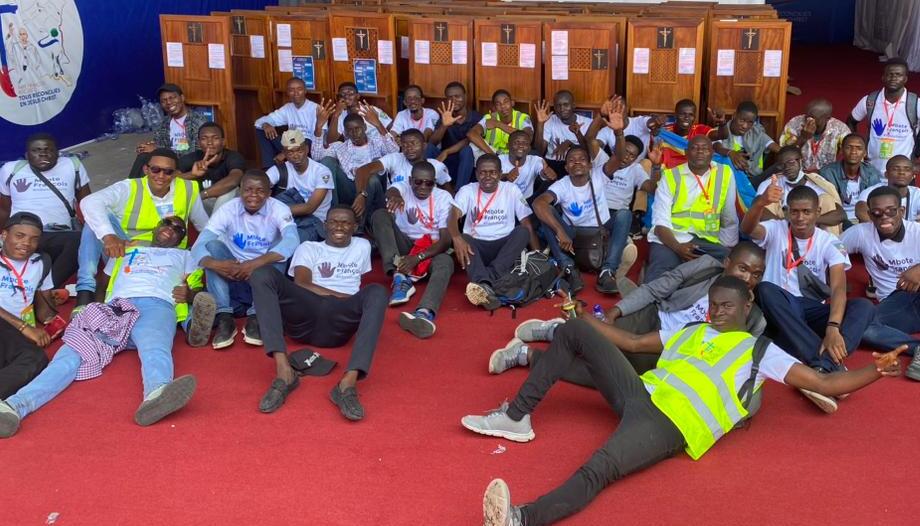









Just as rain soaks the ground and fills it with life, the Pope's words have been a shower of hope in the hearts of this great country. Hope is the word that could sum up his entire trip. Francis has filled with hope the young people, the victims of the war in the East, the priests, religious men and women, the bishops. Now we await the fruits of his words. The Pope's trip is a blessing for all Congolese men and women, a breath of hope in the midst of so many difficulties.
It all began on January 31, when the Pope landed at the Ndjili International Airport in Ndjili, in the Democratic Republic of the Congo. After a brief welcome, the popemobile set off for the Palace of the Nation. The arms raised in the air through the streets of Kinshasa accompanied him without interruption during the 25 kilometers of the trip.
The images speak for themselves: faces radiant with joy, hands in the air, and bodies in continuous movement. What a joy to receive the Pope!
At the National Palace, the Pope's speech to the authorities set the tone for the trip. Francis defined himself as a pilgrim of peace and reconciliation. He encouraged the Congolese to assume their responsibility in building a better future, but what stood out most were the words addressed to the International Community: "Do not touch the Democratic Republic of Congo, do not touch Africa. Stop suffocating it, because Africa is not a mine to be exploited or a land to be plundered. Let Africa be the protagonist of its own destiny".
From the National Palace, he went to the Apostolic Nunciature. There, the Luc Gillon Choir, together with a group of children dressed in St. Lawrence and DRC t-shirts, welcomed him with songs and enthusiasm.
A multitudinous Mass
There were many young people who spent the night of January 31 to February 1 at the Ndolo airport. Everything was prepared for the Mass. The volunteers in charge of the confessionals spent a large part of the night going back and forth to facilitate the sacrament of reconciliation. Hervé, one of the volunteers, said that "a priest, I don't know his name, was heroic, he spent a large part of the night confessing without interruption". I myself was able to participate in the confessions along with other priests until half past two in the morning. People were eager to be reconciled with God and to prepare themselves well for the Mass with the Pope.
In his homily, Francis spoke essentially about peace, which was the theme of the trip. He developed three sources of peace: forgiveness, community, and mission. "Peace be with you. Let us let these words of our Lord resound, silently, in our hearts. Let us listen to them addressed to us and decide to be witnesses of forgiveness, protagonists in community, people on mission of peace in the world."
Under a blazing sun, almost two million people followed the celebration with joy. Geraldine, 84 years old, got up at four in the morning to participate in the Mass. She arrived at 6 a.m., but after standing for an hour, she realized she would not last all morning and had to go home to follow the ceremony on television. Most of the people stood for hours under the sun, but with a smile on their lips: "the Pope does not come every day", one heard people say.
The Mass was in the Zairean rite, and there was no lack of singing and dancing. The choir was made up of more than 700 people, and a group of "joyeuses" (little girls dressed in white) danced during the Gloria and the offertory, as is the tradition at Sunday masses.
The Mass did not last an hour and a half as planned, but was only thirty minutes longer. At the end of the Mass, Cardinal Ambongo thanked the Pope and denounced, in front of the authorities and television cameras, the misery in which the Congolese people find themselves.
From light to darkness
This was the title of an article about the Pope's first day in the DRC. From the light of the Mass to the darkness of the stories of the victims in the east of the country. In July, the Pope's trip was scheduled to include a stop in Goma, the largest city in the east of the country. The situation of insecurity did not allow this stop, but the Pope wanted to receive some victims of the war.
The meeting took place at the Nunciature. The Pope, next to a large crucifix presiding over the room, listened to the horrifying testimonies of the various victims: beheadings, rapes, forced to eat human flesh... This was just a glimpse of the suffering of the people of eastern DRC. It is difficult not to awaken consciences. But unfortunately, many people in the world continue to close their eyes to this reality. Just look at the space that this trip has occupied in the Western media.
The testimonies were followed by a declaration of forgiveness and the deposit at the foot of the crucifix of weapons and instruments that were used against the victims. An emotional Pope thanked the victims for their courage. At the end of the day, some representatives of the charities were received by the Holy Father.
The Pope's hand
The Martyrs Stadium hosted the meeting with catechists and young people. Some eighty thousand people packed the stadium to listen to the Pope who was welcomed like a musical star. To the rhythm of the songs the young people showed their enthusiasm as Francis moved towards the podium.


After a few words from the catechists, the Pope made a historic speech in which he gave the young people five "ingredients for the future," one for each finger of the hand: prayer, community (others), honesty, forgiveness, and service.
After asking us to look at our hands he said, "I would like to draw your attention to one detail: all hands are similar, but none is the same as the other; no one has hands like yours, that is why you are a unique, unrepeatable and incomparable treasure. No one in history can replace you."
An "electric" moment was when the Pope spoke about corruption. Francis made the young people repeat: "pas de corruption", no to corruption. But the young people did more than repeat, and for several minutes they chanted different phrases against corruption.
Young people needed hope and the Pope gave it to them. The Pope's message did not just pass, it resonated with young people. The social networks immediately echoed the five ingredients of the future.
With consecrated persons
A tide of nuns invaded the streets around the Cathedral. In the Congo there are many congregations, some imported, others local. The priests went unnoticed in front of so many nuns dressed in their Congolese habits.
Life in the Congo is full of difficulties, and priests, religious men and women, are in the front line. Francis encouraged us not to fall into spiritual mediocrity; he reminded us of the need for formation, and above all he encouraged us to continue with a life of dedication and service: "Sisters and brothers, thank you from my heart for what you are and what you do; thank you for the witness you give to the Church and to the world. Do not be discouraged, we need you. You are valuable, important, I tell you in the name of the whole Church." These last words filled us with encouragement and hope.
Farewell
Before leaving for South Sudan, the Pope met with the Congolese bishops. Following the passage of Jeremiah's vocation, Francis invited them to be good shepherds: "Dear brother bishops, let us take care to be close to the Lord so as to be his credible witnesses and spokesmen of his love to the people. He wants to anoint them through us with the oil of consolation and hope."
In closing, the Pope asked the bishops to be merciful: "I would like to add just one thing: I said 'be merciful'. Mercy. Forgive always."
At the airport, President Felix Tshisekedi was waiting to see him off. The Pope continued on his way to South Sudan where the agenda would also be tight.
Kinsasa, Democratic Republic of the Congo.












